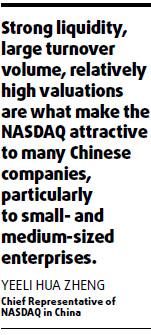NASDAQ sees ChiNext, China's start-up bourse, as an opportunity for cooperation rather than a competitor to its China business, said Yeeli Hua Zheng, chief representative of the US stock exchange in China.
"We have signed a cooperation memorandum with the Chinese side to assist them in launching and operating the new board," Zheng told China Business Weekly in an interview. "It has brought us cooperation opportunities rather than competition."
Zheng said NASDAQ was not worried about the potential negative impact of ChiNext on its business because of China's strong economy and size of the market where millions of enterprises are interested in going public in the United States.
"The cake is big. If even a tiny portion of the companies want to list on the NASDAQ, it would be a good thing for us," she said. "Many Chinese companies will still want to go abroad after a domestic listing in order to expand their investor base in the US." The second batch of the eight companies to list on ChiNext began taking subscriptions from investors last week and will raise a total of 4.9 billion yuan from their initial public offerings (IPOs), more than triple the initially planned amount of 1.6 billion yuan.

Yeeli Hua Zheng
The eight companies have an average price/earnings (PE) ratio of 83, higher than the average of around 50 for the first batch of companies to list on ChiNext. Jinlong Machinery and Electric Co, a Zhejiang-based manufacturer of vibration motors for cell phones, have the highest PE ratio of 126.
The high valuations of the ChiNext companies remain a concern for investors and regulators since the board's debut in October but Zheng noted that such high PE ratio will not last long as the market continues to mature.
"Right now, the Chinese capital market is dominated by retail investors and the irrational sentiment tends to be high," Zheng said. "But I think the high valuations will gradually come down as the market continues to develop and mature."
She said the NASDAQ was willing to share useful market operating experience and technology with Chinese operators and regulators to improve the country's capital market.
As China is stepping up the pace to develop its own capital market, the NASDAQ is taking advantage of China's fast growing economy and competing with other stock exchanges to attract more listings from Chinese companies next year.
Zheng said a total of 30 companies from China have been listed on NASDAQ this year and the prospect for next year will be better.
Among those, the listing of Shanda Games Ltd, a Chinese video game company, is the largest US-listed IPO so far this year. It raised a total of $1.04 billion.
Chinese A/H1N1 flu vaccine maker Sinovac Biotech Ltd last month also successfully transferred its stock exchange listing to the NASDAQ from NYSE Amex to raise more funds.
"Strong liquidity, large turnover volume, relatively high valuations are what make the NASDAQ attractive to many Chinese companies, particularly to small and medium-sized enterprises," Zheng said.
Another Chinese gaming company, Changyou.com Ltd, raised $120 million from its IPO on the NASDAQ in April and has become one of the best performing stocks on the US bourse this year.
When asked about what sectors the US investors will likely show great interest in next year, Zheng said it was more about the quality of a company rather than a specific sector a company belonged to.

"The new energy and biopharmaceutical industries are apparently the hot sectors in the stock market but we have also seen good performances by Chinese companies from very traditional industries such as food processing," said Zheng.
Zhongpin Inc, China's fourth largest meat producing and processing company, last year successfully raised $60 million through its listing on the NASDAQ.
"It is the quality of a company rather than the sector that matters most to US investors," she said.
The New York-based bourse is also keen on becoming the first batch of overseas companies to list on China's A share market as the country is planning to launch an international board in Shanghai next year.
"We are currently in talks with Chinese regulators to push forward the process and are seeking a proper time for our China listing as a company entity," Zheng said.
Zheng said the NASDAQ was waiting for more details from China's securities regulators and the time of its listing had not been decided yet.
Market analysts are expecting the first batch of companies to list on Shanghai's international board to be foreign companies with extensive business in China and red-chip companies that have their business on the mainland but are incorporated outside China and listed overseas.
A number of companies, including global banking giant HSBC and the world's biggest phone company China Mobile have expressed strong interest in listing on the international board.
NYSE Euronext, the parent of the New York Stock Exchange and a rival to NASDAQ, is also keen on gaining a listing in China.





